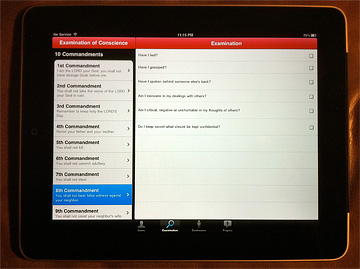Are you getting tired of technology hype? I am.
What am I talking about? The tendency for people – especially those in the media, both old and new – to get overly excited about new technologies, losing perspective in the process.
For example, yesterday I blogged about a new iPhone/iPad app. It’s called Confession: A Roman Catholic App. This app has received plenty of attention, including a New York Times op-ed piece, as well as scores of articles in major news sources. Not surprisingly, there has also been plenty of controversy. A friend told me that she was listening on the news to Catholic priests who are terribly upset about the confession app, even though it was made by Catholics for Catholics.
As I explained yesterday, I bought the Confession app to see what all the fuss was about. It cost me $1.99, and it runs on my iPad and my iPhone. (Yes, I have a trinity of Apple products, including a MacBook Pro. In my last post described in detail how the app works. It’s really quite simple. It guides the user through a time of spiritual introspection based on the Ten Commandments. It suggests specific sins and gives the use an opportunity to log them for future confession.
There are no bells and whistles in the Confession app. No fancy graphics or sounds. There is nothing trendy or kitschy or exciting about the Confession app, other than the simple fact that it is an app, one that runs on portable Apple products. The content of this app could be easily contained in a small booklet without any significant loss of functionality.
Yet, because this “booklet” is an iPad app, it gets the attention of the New York Times and other major news sources. Christians are weighing in right and left, pro and con, happy and sad. Frankly, I think all of this is little more than a tempest in a teapot. The Confession app is not going to bring church renewal. And it’s not going to ruin the church, either.
The folks at Apple must be laughing all the way to the confessional, . . . uh, um. . . the bank. They have created some fine digital tools and have brilliantly managed to make us think their tools are changing the world. And we, or the press, at any rate, believe them. Now I’m quite pleased with these tools. But they are not a big deal. If I happen to receive guidance for confession from reading my iPad rather than a printed booklet, why is that so revolutionary? I also tend to read the Bible on my iPad and I do almost all of my biblical study and writing on my computer. Should this make headlines?
I remember several years ago when the media went ballistic over blogs. Blogs were going to ruin serious journalism forever. Blogs were going to change the world. Soon, everyone would have a blog. Etc. etc. etc. Today, blogs are simply one communication tool among many. They do make a difference, but that difference is far, far less than was once promised (or threatened).
Let’s be clear. The iPad is a tool. The iPhone is a tool. The Confession app is a tool that depends on the others. These are powerful tools, to be sure. They facilitate certain kinds of learning and communication and experience that are quite impressive. But, in the end, they are just tools. And like all tools, they can be used for good and for ill. If we are going to use them for good, then we need to calm down and think. We need to avoid overreacting. We need to get through the hype so we can deal with the substance of the technology and its impact on our lives and our culture.

